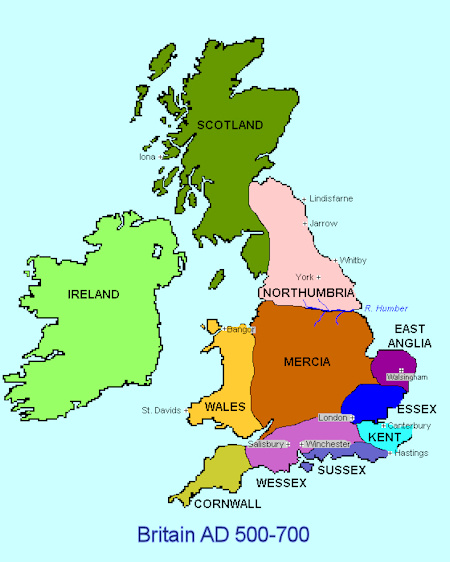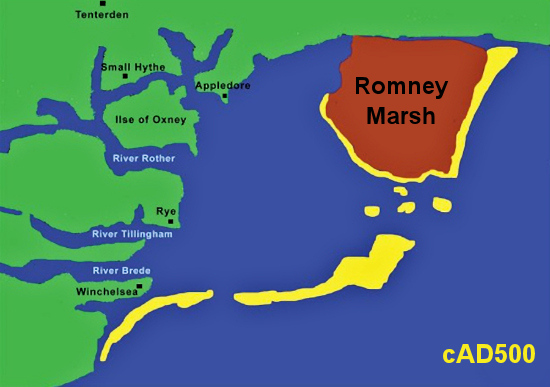Anglo-Saxon Kent
Anglo-Saxon England or Early Medieval England, existing from the 5th to the 11th centuries from the end of Roman Britain until the Norman conquest in 1066, consisted of various Anglo-Saxon kingdoms until 927 when it was united as the Kingdom of England by King Æthelstan (r. 927–939). It became part of the short-lived North Sea Empire of Cnut the Great, a personal union between England, Denmark, and Norway in the 11th century.
The Anglo-Saxons were members of Germanic-speaking groups who migrated to the southern half of the island of Great Britain from nearby northwestern Europe.
Anglo-Saxon history thus begins during the period of sub-Roman Britain following the end of Roman control, and traces the establishment of Anglo-Saxon kingdoms in the 5th and 6th centuries (conventionally identified as seven main kingdoms: Northumbria, Mercia, East Anglia, Essex, Kent, Sussex, and Wessex); their Christianisation during the 7th century; the threat of Viking invasions and Danish settlers; the gradual unification of England under the Wessex hegemony during the 9th and 10th centuries; and ending with the Norman conquest of England by William the Conqueror in 1066.Anglo-Saxon identity survived beyond the Norman conquest, came to be known as Englishry under Norman rule, and through social and cultural integration with Celts, Danes and Normans became the modern English people.
Kent - Anglo-Saxon Kingdom AD 500-700
Kent, one of the kingdoms of Anglo-Saxon England, probably geographically coterminous with the modern county, famous as the site of the first landing of Anglo-Saxon settlers in Britain, as the kingdom that received the first Roman mission to the Anglo-Saxons, and for its distinctive social and administrative customs.
Historically, the Anglo-Saxon period denotes the period in Britain between about 450 and 1066, after their initial settlement and up until the Norman Conquest. The early Anglo-Saxon period includes the creation of an English nation, with many of the aspects that survive today, including regional government of shires and hundreds. During this period, Christianity was established and there was a flowering of literature and language. Charters and law were also established.
According to tradition, the first settlers, led by Hengest and Horsa, landed at the invitation of the British king Vortigern at Ebbs Fleet in Kent around the mid-5th century. After the reigns of Hengest and of his son Aesc, or Oisc (from whom members of the Kentish royal house were named Oiscingas), nothing is known of Kentish history from 512 until the reign (560–616) of Aethelberht, who by 595 had become the overlord of all the kingdoms south of the River Humber. His wife Bertha, daughter of Charibert, the Frankish king of Paris, was a Christian, and it may have been for that reason that Pope Gregory the Great sent Augustine’s mission to Aethelberht’s court in 597. Aethelberht, after his conversion, gave a dwelling place in Canterbury to the missionaries, and hence this became the first and senior archiepiscopal see of the English church.
No Kentish kings ever recovered the overlordship held by Aethelberht, but his great-grandson Egbert (664–673) was king in Surrey as well as in Kent. From the mid-8th century, Offa, king of Mercia, established his power in Kent, which remained subject to Mercia until conquered by Egbert, King of Wessex, in 825. Henceforward, Kent was a province of Wessex, whose kings became kings of all England in the mid-10th century.
The social organization of Kent had many distinctive features, which support the statement of the Venerable Bede that its inhabitants were a different tribe from the Angles and Saxons, namely the Jutes. The place of their continental origin is disputed. Instead of two classes of nobles, or gesithcund, as in Wessex and Mercia, Kent had only one, the eorlcund; and the Kentish ceorl, or free peasant, was a person of considerably greater substance than those elsewhere.
Freehold land in Kent was usually subject to gavelkind, or partible inheritance; administratively, Kent was divided into lathes, apparently centered on royal vills.

In cAD500 Romney Marsh was about a third of the size it is today - see map right ►
See also The Making of the Marsh
![]() Reference and more information
Reference and more information
The name Romney is derived from Old English 'at the spacious, or wide, river' recorded in 895 as Rumenea, and in 914 as Rumenesea. This appears to have been an early name for Romney Marsh, whose inhabitants are referred to in 774 as Merscuuare and in 796 as Merscware (Old English merscware: marsh people). Their territory is described in 811 as regio Merscuuariorum (region of the Marsh People); and earlier, in 697, there appears here the name Ruminingseta: 'fold of the dwellers by the spacious river' and Rumeneia.

Map of Romney Marsh c AD500
The name Romney is derived from Old English 'at the spacious, or wide, river' recorded in 895 as Rumenea, and in 914 as Rumenesea. This appears to have been an early name for Romney Marsh, whose inhabitants are referred to in 774 as Merscuuare and in 796 as Merscware (Old English merscware: marsh people). Their territory is described in 811 as regio Merscuuariorum (region of the Marsh People); and earlier, in 697, there appears here the name Ruminingseta: 'fold of the dwellers by the spacious river' and Rumeneia
Rumeneia was the name of the river we know as the Rother, which used to flow into sea at New Romney but now flows out through Rye. It would appear that this river had different names in different parts of it, which is not unusual and happens elsewhere in the country. Near the source or spring head, it was likely called the Rother. Lower down and along the branch which flowed out to the sea at the Roman port Portus Lemanis near the Roman fort at Stutfall, the Limen and as the Rumeneia near New Romney. Hence the name Romney. The present place names appear as Rumney, Old Rumney in1575, and as Romney, Old Romney in 1610.
Romney Marsh was known by the English Saxons first as Merscwarum and then, in c795, as Merscware. It is not certain when it first became know as Rommene, or Romney. There was mention of this name in 895 related with land owned by the Archbishop of Canterbury near the river called Rumeneia.


